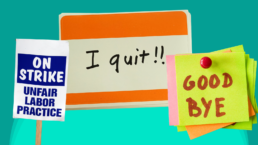By Erika Rodriguez, The Guardian
Despite quizzical think pieces on the motivations behind the Great Resignation, anyone who pays rent or a mortgage knows why this “labor shortage” is under way. After years of inflation and stagnant wages, the pandemic has revealed the value of labor, the worthlessness of commutes and office culture, and the importance of finding personal comfort in times of increasing precarity.
In other words, we are living in what labor economist Lawrence Katz calls “a once-in-a-generation ‘take this job and shove it’ moment” – which gives workers a once-in-a-generation upper hand.

The potential of this cultural moment is not limited to the 2.9% of the workforce who have quit their jobs in the past few months. As CEOs scramble to maintain retention rates, those who have kept their jobs can express solidarity with resigning workers and contribute to the cultural shift by slowing the pace of productivity.
What I am proposing is not exactly a “slowdown”, but a “slow-up”.
Traditionally, a slowdown is a strike tactic in which workers remain on the job but slow productivity with the aim of negotiating for a particular objective, such as higher wages. In this sense, a slowdown is a highly localized and temporary effort.
Recent Posts
“The Blue Road To Trump Hell”: Norm Solomon On “How Corporate Democrats Paved The Way For Autocracy”
December 31, 2025
Take Action Now “If you don’t examine real history, then you’re in a cycle that repeats the same problems,” says Norman Solomon, director of…
Why is the Democratic party hiding its 2024 autopsy report?
December 30, 2025
Take Action Now If the DNC isn’t open and transparent about why they lost, then how can we be sure they will learn their lesson this time?By…
Anti-ICE Resistance Sprang Up Across Red States In 2025
December 29, 2025
Take Action Now In Texas, North Carolina, Alabama, Tennessee, Florida, and beyond, grassroots resistance to ICE is growing.By Sonali Kolhatkar,…
Trump Suggests US Bombed ‘Big Facility’ in Venezuela. No One Seems to Know What He’s Talking About
December 29, 2025
Take Action Now Administration officials have yet to provide any details about the supposed strike, which would mark a massive escalation in the…




